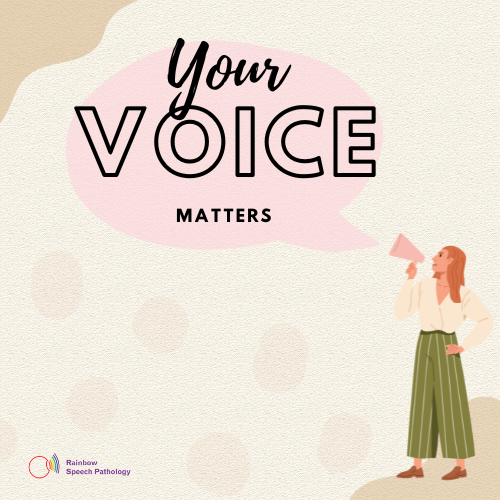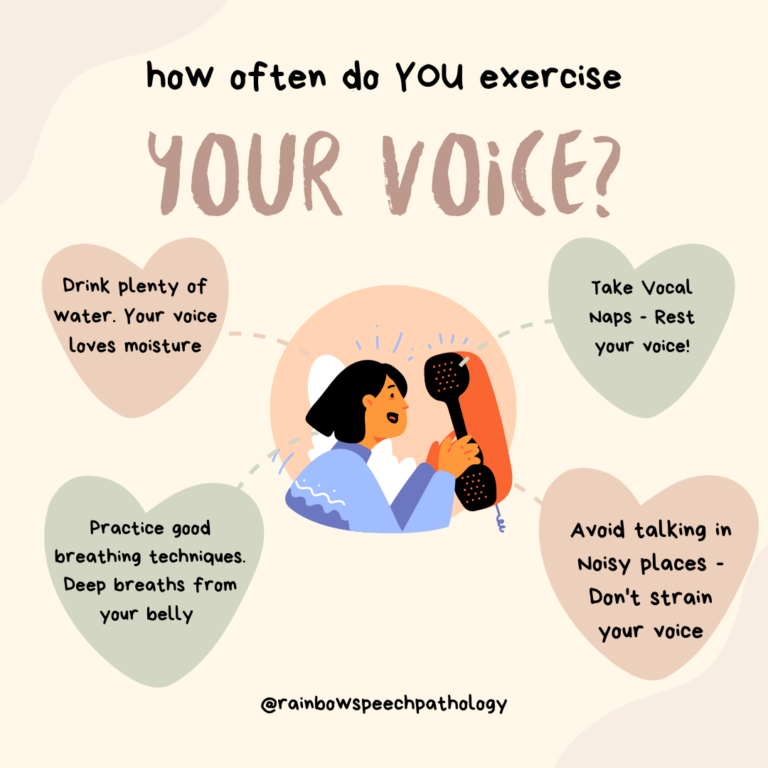Your Voice Matters - Voice Disorders
Did you know that Speech Pathologists can treat voice disorders?
What is voice?
The sound of your voice is produced by vibration of the vocal folds, which are two bands of smooth muscle tissue that are positioned opposite each other in the larynx which you might have
heard be called the voice box.When you are not speaking, the vocal
folds are open so that you can breathe. When you speak, the vocal folds move
together while air from the lungs blows past, making them vibrate – like
blowing on a piece of grass or paper to make it whistle.The vibrations produce sound waves
that travel through the throat, nose, and mouth, which act as resonating
cavities to change the sound. The quality of your voice—its pitch, volume, and
tone—is determined by the size and shape of the vocal folds and the resonating
cavities. This is why people’s voices sound so different and why some people
are able to impersonate the voice of other people!Having unhealthy vocal practices or a vocally demanding job such as a singer or teacher, can put someone at risk of developing voice problems. It is estimated that 4% of the general population experience voice disorders in any one year in Australia. Taking care of your voice, is important!

Something is wrong with my voice!
Causes voice problems:
- Upper respiratory infections
- Inflammation caused by gastroesophageal reflux (sometimes called acid reflux, heartburn, or GERD)
- Vocal misuse and overuse
- Growths on the vocal folds, such as vocal nodules
- Cancer of the larynx
- Neurological diseases (such as spasmodic dysphonia or vocal fold paralysis
- Psychological trauma.
How do you know when your voice is not healthy?
You may have a voice problem if:
- Your voice has become hoarse or raspy
- You have lost your ability to hit some higher notes when singing
- Your voice suddenly sounds deeper
- Your throat often feels raw, achy, or strained
- You find yourself repeatedly clearing your throat
If you think you have a voice problem, consult a doctor to determine the underlying cause. A doctor who specializes in diseases or disorders of the ears, nose, and throat is an otolaryngologist or ENT. They may refer you to a speech pathologist who can help you improve the way you use your voice.
Most voice problems can be reversed by treating the underlying cause through a range of behavioural and surgical treatments.
How to take care of your voice – if you are experiencing some voice changes
- Drink plenty of water, especially when exercising.
- Try to limit how many caffeinated beverages or alcohol you have and balance your intake with plenty of water.
- If you live a cold or dry climate, use a humidifier in your home. Healthy vocal cords are at their best when they are well moisturised! Breathing in dry or cold air can irritate your throat and vocal cords.
- Avoid or limit use of medications that may dry out the vocal folds, including some common cold and allergy medications. If you have voice problems, ask your doctor which medications would be safest for you to use.
Take vocal naps— rest your voice throughout the day
- Try not to overuse your voice. Avoid speaking or singing when your voice is hoarse or tired.
- Rest your voice when you are sick. Illness puts extra stress on your voice.
- Practice good breathing techniques when singing or talking. Support your voice with deep breaths from your belly or diaphragm, and don’t rely on your throat alone. Singers and speakers are often taught exercises that improve this kind of breath control. Talking from the throat, without supporting breath, puts a great strain on the voice.
- Consider using amplification (a microphone or megaphone) in loud environments.
- Avoid talking in noisy places. Trying to talk above noise causes strain on the voice.

Maintain a healthy lifestyle and diet:
- Avoid irritants such as smoke and dust. Smoke irritates the vocal folds. Also, cancer of the vocal folds is seen most often in individuals who smoke.
- Avoid eating spicy foods – especially if you have reflux. Spicy foods can cause stomach acid to move into the throat or oesophagus, causing heartburn or GERD.
- Avoid mouthwash or gargles that contain alcohol or irritating chemicals.
Written by: Jonathon Cronk – Speech Pathologist


